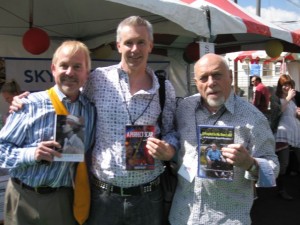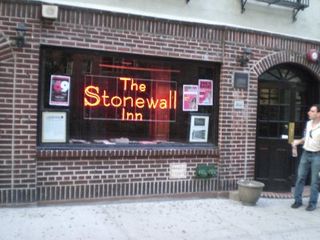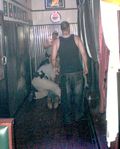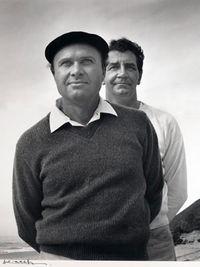I sit next to my attorney silently, facing the immigration judge. I am told
my case (aka my life, aspirations and my body) is under his jurisdiction. I am
dressed as professionally as possible to aptly represent my "Alien of
Extraordinary Ability" status. I nervously look around the room. My dark
eyes catch another attorney behind us signaling me to take off my hat. Promptly
I take off my favorite accessory (my only sign of faggotry) to show my
compliance with the US
judicial practices. The judge begins his inquiry, to which my attorney reveals
my HIV status, and my inability to adjust my status even though my petition for
permanent residency to the US
was granted on the basis of my claim as an "Alien of Extaordinary
Ability" in February 2002.
The pain of hiding underground, days of unemployment, hunger, fear of
accessing treatment leading me to near death flashes across my mind. Where
would I turn for the wasted seven years of my life? Will this judge be able to
understand the lost wages, aspirations, depression and most of all the
psychological violence of being separated from my beloved parents? It is clear
my journey to justice is only beginning.
This blog post is my first public step in ending isolation, silence, fear
and their antecedent dysfunctions that the HIV ban on immigration and travel
has wrought upon my life. It has disrupted my educational, work and all major
life aspirations. I have silently watched my friends getting married, accessing
green card, completing their PhD's and accumulating life assets. I have very
vocally over the last six years worked with LGBT immigrants, helped them with
their asylum claims, and watch them move on with their lives. Whereas, I have
had to hide in fear, live on friends couches, clean apartments, meticulously plan
my travels within the US, face Kaposi Sarcoma, PCP
(all very avoidable if medications are accessed on time). Publicly my body is
mapped as that of an Immigration and Education Policy Expert, whereas privately
I have been intimately aware that any inkling of my health status would
have me labeled "diseased, public burden." Yet I know that my life
and story is not the only one, there are several HIV positive immigrants
silently waiting for some form of relief, as they continue to work hard, and
pay taxes.
United States
has denied the entry of HIV+ people for both short term travel and immigration
since 1987. This exclusionary practice follows a long history of excluding
immigrants into the United States
on public health grounds. Since the 1890’s the US Congress empowered the federal government to turn
back those with loathsome or dangerous contagious diseases. The rational for
such exclusions ostensibly being two folds; i) protecting the public health of
US citizenry and ii) Reducing the burden on health care
expenses of the US government. The intersections of racism,
xenophobia and public health becomes evident when these bans are contextualized
within the demographic profiles of generations of incoming immigrants and those
who are excluded.
In the early 1990’s during the Haitian
Refugee crisis, all Haitian detainees at
were forcibly tested for HIV, and those found
positive were detained in Guantanamo
un-hygienic conditions. The Haitian Centers Council successfully fought a case
for the release of the terminally ill detainees. The entire situation created a
renewed fear of “diseased foreigners”, and prompted Congress to consider
legislation that legally deemed HIV+ persons as “inadmissible”. Review of
the congressional hearing proceedings reveals deployment of xenophobic, HIV
phobic and homophobic remarks by those in support of the ban. A large coalition
of medical, legal and LGBT rights organizations opposed the ban, but in wake of
virulent AIDS phobia and stigma of the early
1990’s, and fear of a flurry of HIV+ immigrants driving up health care costs in the US, the ban was adopted.
The ban has disproportionately impacted immigrants of color, since majority of
recent immigrants to the US
are from Latin America, Caribbeans,
also be argued that the ban like other bans in the past is deeply rooted in
scientific racism, xenophobia and homophobia.
Efforts to remove the HIV ban have largely been organized by
HIV/AIDS, LGBT rights and some immigrant rights organizations. In 1990, several
medical, Gay and Lesbian and Immigrant organizations such as Gay Men’s Health
Crisis, the American Medical Association lobbied the Health and Human Services
(HHS
inadmissible diseases. As the HHS
recommendations, the then Republican dominated Congress pushed through a bill
that eventually made it a law to ban HIV+ individuals from entering the
country. Since then, extensive on the ground organizing has been conducted by
grass-roots immigrant organizations, who worked to push policy organizations to
bring the removal of the ban back as an agenda item, to their work. In May of
2006 the “Lift the Bar Coalition” was formed, lead by Gay Men’s Health Crisis, Queers
for Economic Justice, The Audre Lorde Project, Immigration Equality,
HIV/AIDS organizations such as African AIDS Services and AIDS Action along with
immigrant rights organizations such as the National Immigrant Justice Center.
to "Lift the Ban”. I recall organizing community forums, wanted to
announce loudly my own health status, and the ways I have had to hide in fear.
On July 2008, after years of
significant on the ground organizing, and lobbying “Lift the Bar Coalition” was
successful in removing the HIV ban language from the “Immigration and
Nationality Act”. The coalition met with offices of Senator John Kerry and
Representative Barbara Lee to tag the removal of the ban along with the “President’s
Emergency Plan for AIDS Relief” (PEPFAR).HIV still remains on the list
“inadmissible diseases” with the
possible laxer standard, we are yet to see these being finalized.
As I continue to wait to adjust my status, I have begun my own
journey to health and justice. Justice for me would be the very undoing of
stigma in legal and societal practices for people living with HIV and AIDS,
people from disability communities, and many other folks who are labeled
diseased and marginalized. On the eve of the National Equality March, I
challenge all of us to go beyond notions of equality under the law, and invite
us to re imagine the basic foundation of our LGBT movement as
"transformative justice". While cost-benefit analysis along
with equality as a rhetoric helped us push the lifting of the HIV Ban with
lawmakers on H street
when I can visit my beloved parents after being separated from them for
13years. I will see justice when every immigrant is imagined as a human being
with dreams, aspirations and emotions. Justice will shine when all LGBT people
will be able to live life free of shame and fear, and for each of these to
happen we need to go beyond our focus on public policies, we need to expand our
work to incorporate strategies that fundamentally alter power relations in
society.
As I get ready to hit the "publish" button on my
laptop, I fear of what may come from being public through this blog while
my case is still pending. At the same time I am letting go of pain, fear and
silence that almost drove me to near death. Finally, I have to admit I am
planning on "getting on the bus" for National Equality March, however
mine is a bus for justice, peace, redistribution of economic resources, labor
and human rights, all intrinsically related to the liberation of LGBT people.
Find me marching with friends and long time allies at the National Gay Lesbian
Taskforce. The Taskforce over the years has shown me they
are reflexive about their mistakes, build on victories and have historically
fought for policy changes along with building a movement for social justice.
Whom ever you march with, party with or end up hooking up with at the after
march revels; ensure to spread the passion for liberation and justice.
Note: this post is dedicated to my beloved mother, father, my friends
and allies; Myna Mukherjee, Raili Roy, Sougato Kerr, Nancy Ordover, Carl
Utt, Navid Alam, Amar Puri, Maria Nakae, Ken Williams, Prantik Saha, David
Fuentes, Shweta Malhotra, Marian Thambynayagam, Angela Mooney D'Arcy, Mia
Mingus, Sonali Sadiquee, Kerry Lobel, Beth Zemsky, Amber Hollibaugh, Abbie
Boggs, Suzanne Pharr,Joo Hyan Kang, Trishala Deb, Mimi Jefferson, Debra
East, Leslie Van Barselaar, Jo Anne Demark, Monami Maulik, Bo Young,
Joey Cain, Lisa Thomas Adeyemo, Sue Hyde, Lisa Weiner Mahfuz, Rodrigo
Brandao, Michelle Lopez, Susan Misra, Ruso Panduro, and all the
hot leather daddies who have helped me rediscover my body and ability to
experience pleasure.






